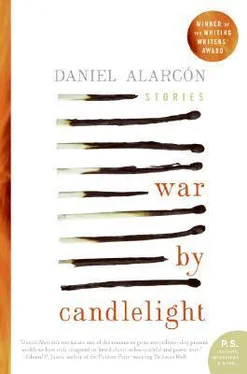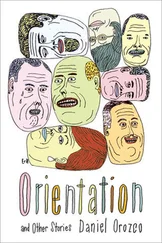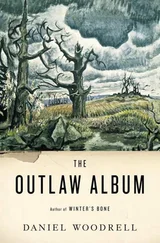But in public, they showed no signs of retreat. Maruja stayed with her union. Fernando traveled to the interior and back, lightning trips to visit universities in Piura and union meetings in Huancavelica, returning to Lima on the overnight bus to see his daughter in her crib. His promise — to never leave Lima — was not mentioned.
He took Carmen with him one day when he was called to the home of a murdered syndicalist in San Juan de Lurigancho to offer the Party’s condolences. It was daylight and safe, he thought, but he hated this work. The man had lived in that part of the city built of dust. The bus let Fernando off in front of a newspaper stand. It was a warm day, inexplicably sunny. Children in tattered clothing watched Fernando as he passed, while his baby girl slept against his chest, oblivious. He’d been here, to this very home, ages ago, in the dead of night. Fernando had met the murdered man, but no picture came to mind: no toothy smile, no salt-and-pepper hair, no bushy eyebrows or face creased with wrinkles. It worried him. Now he would meet the man’s widow, and the prospect of her sadness seemed daunting. He walked on to the house, certain his feet would remember the way. His daughter yawned. Her tiny mouth opening, she blinked, and then fell asleep again. It took only a moment. Her hair had fallen out a few weeks after birth: thin, reddish brown, and straight like her mother’s. Fernando held her in his shadow so that the sun wouldn’t wake her.
He was walking along a dusty street a few blocks from the bus stop when a boy came toward him with a steady stare. He appeared suddenly from the shadowed doorway of a storefront, as if he’d been waiting. “Hey, mister,” he asked, “are you the man from the city?”
He said city as if it were far away. Fernando shook his head and walked on.
But the boy insisted. His voice was deep for his size, or maybe he was small for his age. “She’s waiting for you. Señora Aronés.”
“The widow?”
“My mother,” the boy said flatly. He cupped a hand over his eyes. “She said you were coming.”
Fernando followed the boy. “How is she?” he asked.
“The house is just over there.”
“Is there anything I can do?”
The boy frowned. “Were you his friend?”
“We worked together.”
“I’m not stupid, mister.” He rubbed his eyes. “You got him killed.”
Fernando stood, dumbstruck. The boy didn’t back down. His jaw was set fiercely. He hates me, Fernando thought, and the idea shocked him. “You’ve misunderstood, son.”
But the boy didn’t answer. Someone from the house had recognized Fernando, was calling his name, “Negro…”
“My mother’s in there,” the boy said grimly and walked away.
The home was surrounded by mourners. Fernando made his way inside, shaking hands on the way with men who recognized him. No one here seemed to blame him. Still, he felt numb. There were more people crowded inside, forming a circle around the widow. Fernando sat on the dirt floor. The widow thanked him for coming without even glancing up at him. When she finally looked up, she nodded. “You’ve been here before.”
“Your husband was a good friend.”
Someone brought him a glass of soda and he drank politely. He was there to watch her cry. He was there to show that she hadn’t been forgotten.
“Can I hold her?” she asked after a moment. She meant Camucha. The widow’s face was flush and red. He looked around her bare home; all her worldly possessions could fit into a trunk. And now she had lost it all. It was there on her face for anyone to see. Her son would never recover. Fernando passed her his sleeping child. Something like a smile graced the widow’s lips, flashed for a moment, and was gone.
VIII. La Uni, 1977
At La Uni, they were safe. Inside they could speak their minds, wear their affiliations on their sleeves. Students denounced their professors, stormed out of class and into the streets. Some disappeared into the mountains to learn the art of war. Every wall spoke politics: an angry poster announced a meeting; a slogan appeared, scrawled in red across the bricks. With angry partisans looking on, a frightened groundskeeper painted over it all. He did it every week.
Some hid their entire adult lives in and out of halls of La Uni. Fernando knew them. One man, Victor, never stayed in a house very long, two weeks but not more, and came to the university with fake papers to meet his comrades. He had left medical school in his second year and spent some time in Cusco with the peasants during the land takeovers. He plowed the earth with the Indians and carried water for their crops in leaky wooden pails. Back in Lima, he threw rocks at the Presidential Palace and broke windows at the Congress building. When the situation allowed, he set fires, and then people began to whisper his name. In 1977, he was already wanted. His friends remarked that the posters made him look even slighter than he was.
Victor fell ill in the early spring. A man came looking for Fernando at La Uni and told him the news. The messenger was paunchy and dark, careful with his words. Each syllable escaped through his teeth, so Fernando was forced to lean close simply to hear him. It was the way people in the movement spoke. “Victor needs a doctor. He says he knows what it is, only he can’t operate on himself.”
Fernando’s brother Enrique was a doctor. He had trained in North America. He would know someone, or he could even see the patient himself. Fernando called him and they met at Inés’s house in San Miguel. It was a Saturday afternoon in October. Inés poured drinks while her brothers spoke. Her two boys ran through the living room, screaming and laughing. They attacked their uncles with hugs and jumped into Enrique’s lap. “What are you learning in school now, Ciro?”
“Nothing,” the boy said, laughing.
“And you, Guillermo?”
“Can’t remember.”
He was only in first grade, but Fernando was afraid it was true. Public schools in Lima were not like Independencia; they were crowded, chaotic, dirty. Enrique was urging Inés to save for a private school. The boys ran outside to play.
When it was quieter, Fernando told Enrique about Victor. “He’s a friend,” he said. “He can’t go to the hospital.”
“Don’t ask me to get involved, Nano.”
“Involved?” Fernando laughed. “Come on, hermano . It’s just a small favor.”
“I wish I could help.”
“It would all be very quiet.”
Enrique shook his head. “I’m sorry.”
Inés’s boys were kicking a deflated plastic ball in front of the house. Ciro waved and smiled through the window, then kicked the ball straight at them. Both Fernando and Enrique flinched, but the ball ricocheted harmlessly off the iron bars in front of the glass. The boys smirked, then Ciro raised his arms and shouted gol with such exuberance that Fernando couldn’t help but smile.
But Enrique didn’t. He turned away from the window.
“Well?” Fernando asked.
“You know what, hermanito ?” Enrique said in a sharp whisper. “I have a wife. I have two daughters. I have a son on the way.”
They had discussed this before, across their father’s kitchen table in Arequipa: What will you do when the time comes to act? What is demanded of people like us in a country like this?
“When you’re my age you’ll understand, Nano.”
A radio hummed in the background. They could hear Inés singing along to the old tune from the kitchen. Enrique got up without saying another word. Fernando watched his older brother through the window. Enrique picked up one of the boys and put him on his shoulders. The boy shrieked with delight.
Sometimes Fernando thought they scarcely seemed like brothers at all.
Читать дальше












